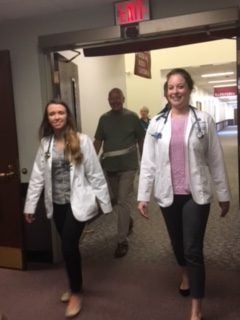This past spring URI piloted its first Interdisciplinary Assessments of Chronic Complex Neurological Patients. The program involves students training to be physical therapists, pharmacists, speech therapists and audiologists, nurses, physician assistants, medical doctors, occupational therapists, registered dietitians, and psychologists. This past year students were broken up into teams of eight and assigned a volunteer from the community living with a neurological disorder. During the Spring 2018 semester, 54 students participated across disciplines. Diagnosis included: Parkinson’s disease, Multiple Sclerosis, Stroke, Traumatic Brain Injury and Spinal Cord Injury.
In the program the team of students assess an adult with a chronic complex neurological disorder and determine cross-disciplinary needs for their assigned volunteer. Groups meet four times over the course of the semester. One of these four sessions includes an in-person assessment with the adult volunteer. The program provides student with training in: interprofessional teamwork, team-based patient assessment and how to develop a team-based comprehensive treatment plan. Students present their assessment and care plan to other faculty and students at the end of the program, as well as share their care plan with the volunteer’s medical physician. Recommendations provided to volunteers are team-based and revolve around “life skills.” Dr. Janice Hulme of URI’s Department of Physical Therapy, notes: “These life skills may include activities of daily living to promote back to work and home life, which involves physical, cognitive and medical intervention.”
URI Faculty involved in this initiative include Janice Hulme and Anne Marie Dupre of Physical Therapy, Geoffrey Greene of Nutrition and Food Sciences, Mary Cloud of Nursing, Erica Estus of Pharmacy, Mark Robbins of Psychology, Elizabeth Connors and Rachel Smith of Communicative Disorders. Students from both psychology and physical therapy are assessing pre and post changes of participating students’ attitudes, skills and readiness to participate in interprofessional practice.
Through gaining experience in the four competencies, Dr. Janice Hulme of Physical Therapy states, “students are taught more by the volunteer than they expected,” and describes it as a life changing experience for students. In other words, students learn their assigned volunteer is living with a complex condition that can impact cognitive and/or physical functioning, but these volunteers learn to cope with these challenges and are still very high functioning. Students learn how they can collectively work together to improve the health and quality of life of the patients.
Subsequently, students practice interprofessional communication through a variety of mediums. They communicate with the patient and each other as well as write up written recommendations which are presented through a virtual poster session upon program completion. Students are exposed to values and ethics through working with such a complex population. Hulme describes, “students look at activities of daily living, such as if their volunteer can cook and shower alone.” Such inabilities truly influence the recommendations provided by students, as well as help students, “learn to have more empathy for the patient. Students see a different piece of healthcare and how successful people can be regardless of disability.
Students learn the different roles and responsibilities of interprofessional teams through watching students from each discipline complete their assessments with the patient. Hulme reflects how faculty did not realize how valuable observing students from each discipline complete assessments would help students understand roles and responsibilities of each healthcare professional and in turn work together as a team to provide holistic recommendations for their volunteer. She notes, “students watch each other do assessments, which brings everything together to provide a group recommendation.” Watching students perform individual assessments was necessary to help students from each discipline work together to provide a “life skill” rather than just a skill or recommendation from their discipline.
Dr. Erica Estus in the College of Pharmacy states, “Students learn about other measures and disciplines used in practice, such as the TUG , and correlating this information from other disciplines and how it works within their own disciplines and recommendations.”
In the future, Hulme hopes to modify the debrief portion of the program to include a more formal debrief with students, faculty and volunteers. Doing so will allow volunteers to also evaluate and provide students feedback on their assessment of volunteers and recommendations.

